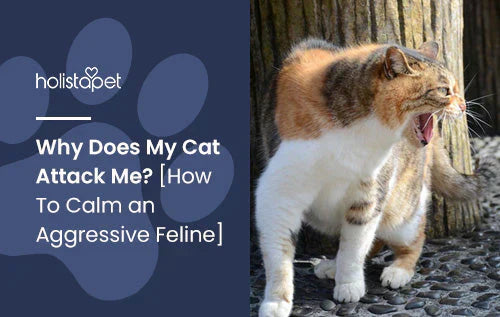Cats can be pretty crazy sometimes, but that's part of why we love them so much! If they are attacking you often (or if they've hurt your feelings), you might be wondering. Most cats attack their owners as a natural part of their play, but what if something more serious happens? Does your cat hate you? Or are they just having a bad day? Making sure your cat has plenty of mental and physical stimulation can help keep their behavior balanced and their wellbeing in check.
Soon, you'll worry no more because this article is here to save the day! You'll learn why cats attack people, how to identify if your cat is play attacking, and even some methods for stopping your cat from attacking you. If you're worried about an aggressive cat or curious why your cat won't stop attacking your hands, read on for all the answers!
Why Does My Cat Attack Me?
If you're wondering why your cat is attacking you, it's important to keep in mind that there are many possible reasons for it. Many of these reasons come from normal feline behavior. With the right approach, these types of behaviors are often correctable. But, if your cat's aggression is related to a medical condition, there may be cause for some concern. To give you an idea of why your cat might be getting feisty with you, here are nine reasons they may be showing some aggression.
Over-Excited Kittens & Cats
Young cats direct their high levels of energy into physical contact and activities. An over-excited cat might express this as play aggression by attacking you or chasing you around. Many cats are high-energy animals, and aggressive behaviors are not uncommon for cats to express their energy. Pet parents might not understand this behavior initially, but remember that your cat attacks might be their attempt at having fun!
Seeking Attention
Cats proudly carry their iconic reputation as solitary, sometimes snarky animals that cause them to cat attack. Admittedly, their attitude is a big part of their appeal (who doesn't love a good grumpy cat?). But you might be surprised to hear that cats can be quite needy! They'll express this in many creative ways (my cat likes to chew paper!) that can range from knocking cups over to seemingly aggressive behavior. It is not out of the ordinary for a cat craving attention to chase you and attack your feet or hands, or generally act up.
Fearful Cats
A fearful cat might attack or become aggressive based on what they feel is self-defense. Self-defensive aggression will often result from a cat feeling trapped or under threat. But many other things can trigger a cat's fear, like the introduction to a new cat, loud noise, or a visitor. If your cat feels that they do not have an easy escape in these situations, they may become fearful and aggressive. CBD oil for cats may help calm their nerves and reduce anxiety in stressful situations.
Redirected Aggression
Redirected aggression happens when your cat is stimulated by something. This could be from another animal, person, or even a loud sound that your cat cannot physically interact with. The resulting behavior is directing this energy towards people and things that your cat can reach, such as you and the other things in your cat's immediate environment.
We've all had times where we've walked in on a tense situation, only to catch the heat ourselves just by being there, and this situation is not so different! Cats do not do this to be malicious, but it can be difficult for them to hold back when excited.
Natural Predatorial & Dominant Instincts
Cats are natural predators adapted to hunting and trapping their prey. Nature has cats hardwired to have natural levels of territorial aggression. This makes them want to hold dominance over their living space. While these qualities do not give your cat free rein to act as they please, being aware of these instincts is important in being fair to your kitty and understanding their behavior.
Cats will often express their predatory instincts around the house by play attacking, chasing, or stalking toys and people! So if you see your cat hunched low with its tail wagging high, beware of a potential ambush!
Maternal Instincts
Like humans and most other animals, a mother cat will do whatever it can to protect its family members. Individual cats' territorial aggression will vary. But female cats will generally have a stronger urge to protect their kittens and themselves. If they are a new mother, try to read your cat's body language to try and give them the space to feel comfortable and protected.
Medical Concerns
There is a possibility that your cat's behaviors could result from pain-induced aggression. Because cats are unable to communicate in the way that we do, when in pain, they may lash out as a way to tell us that they are uncomfortable. If you notice petting-induced aggression or generally aggressive behavior, an injury or sickness could be the cause. The seriousness of this can vary, but if a medical concern seems to be to blame for your cat's behavior, finding veterinary advice might be the key to relieving their problematic behavior.
Sexual Aggression
Cats that have reached sexual maturity might express latent sexual aggression. The mating process of cats can often seem harsh in the perspective of humans like us, and it can include scratching and biting! Latent sexual aggression refers to the potential link between aggressive behaviors and the breeding process, expressed as aggression towards the owner. This is a more common in male cats, even those who have gone through neutering.

Related Post: How To Calm a Cat in Heat [Basic Home Remedies To Calm Your Kitty]
Idiopathic Aggression
"My cat viciously attacked me unprovoked. "This type of aggression includes any behavior that cannot be explained by the cat's behavior history or through a medical exam. Cats with this type of aggression may violently attack their owners without holding back their full force, potentially causing injury. Cats with idiopathic aggression can remain aggravated for extended periods. This can cause them to bite and scratch repeatedly.
Other forms like redirected aggression must be closely monitored and ruled out before diagnosing idiopathic aggression. Because cats with idiopathic aggression can be dangerous, cat owners must take the steps needed to determine the cat's quality of life, their safety, and the people around them.
Identify Why Your Cat Is Attacking
Now that you know some reasons why cat aggression can occur, it might be less of a mystery when your cat engages in rough play or displays offensive body postures. Once you've determined why your cat is acting aggressively, it will be easier to plan how to address the problem. Some easy methods you can use to help determine the cause of their aggression:
- Please pay Attention to Body Language: Keeping track of your cat's body language can tell pet parents a lot about where their mind is at. Cats will often arch their backs and push their fur out to increase their perceived size when aggravated, barring teeth and even hissing when they are upset. They will also often flatten their ears and widely display their eyes to create fear in their prey. If you carefully assess your cat's body language, you will learn their mood and know the warning signs of aggression.
- Record Attacks in a Log: If you are dealing with a particularly naughty cat, it can be helpful to record instances where they have shown aggression. This can help you find similarities between the different times when they have acted up, allowing you to figure out a behavioral pattern. This method also creates an easy and organized way to present your information to a vet. This way, they can better help you determine the cause.
calming properties and well-tolerated nature, making it appropriate for daily consumption. Even better is that CBD products like our CBD cat treats can double as a tasty reward. These are perfect for encouraging good behavior while lowering environmental stress. If your cat acts up from discomfort, CBD can also help them feel more at ease and comfortable. This can reduce their urge to act aggressively or lash out at those around them.
Interact & Play With Your Cat Daily
Giving your cat attention can help to deter it from acting up. Cats need love and interaction, and playing with them regularly is necessary to have a close relationship. It also keeps them happy! Look for times when your cat is in a playful mood and take those opportunities to interact with them using toys like pole-type toys, things to chase, and your hands for belly rubs! If you'd rather avoid them attacking your hands, you can also throw their favorite toy around!
Provide More Environmental Stimulation
Environmental stimulation, like boxes, things to climb on, and scratching posts, are key to keeping a happy cat. Try keeping some fun objects around for your cat to explore, or consider investing in a cat tree/house, so they always have a fun place to hang out and explore.
Utilize Deterrents In Common Stalking Area
Why is my cat randomly attacks me or why do cats randomly attack? If your cat has a favorite spot to attack you, you might consider using deterrents to keep them away! Making these areas undesirable to your pet will make them reconsider attacking you so you can rest easy when walking down their favorite dark hallway. Some commercial products are available for this, like small traps and noisemakers that will discourage your cat without hurting it. Eventually, it will stop returning to these areas associated with loud sounds and being startled.

Prevent Attacks On Ankles
The ankles are a common place cats attack due to their exposure and easily accessible location. If your cat tends to attack your ankles, you can enact some easy responses to discourage them. Firstly, it is important to understand not to run away; this communicates a prey-like behavior to your cat, further encouraging them and exciting them to bite down harder. Instead, try gently pushing closer to them with your ankle and remaining calm. That will show the cat that you are not their prey, causing them to eventually let go and lose interest.
Put Them In Time Out
If your cat has a hard time calming down when playing, it can be worth giving them a short time out. Disengaging their aggressive behavior will take the fun out of playtime, communicating that such behaviors will result in a shortened session. To put them in time out, turn away from them, and give them no attention. Cutting them off from their source of excitement and entertainment will help teach them to avoid attacking you if they want attention! CBD Calming Chews for Cats can also be a great way to help them relax and feel more at ease.
Final Thoughts - Why Does my Feline Attack me
Understanding why your cat attacks you is key to addressing the issue and strengthening your bond with them. Whether your cat is attacking due to playful behavior, fear, redirected aggression, or natural instincts, it's important to recognize these triggers and respond appropriately. Remember, punishing bad behavior will likely escalate the problem, so it's essential to use positive reinforcement and provide plenty of environmental stimulation.
If you're wondering, “Why does my cat attack my feet?” or “why does my cat keep attacking me?”, the answers often lie in understanding their behavior. Cats frequently play attack as part of their natural instincts, and these behaviors can be managed with patience, appropriate play, and consistency.



 CBD Oil for Cats - Fast Acting
CBD Oil for Cats - Fast Acting
 CBD Cat Treats - Easy Dose
CBD Cat Treats - Easy Dose
 CBD Calming Chews for Cats - Highly Rated
CBD Calming Chews for Cats - Highly Rated
 CBG Oil for Dogs and Cats - Loved by Thousands
CBG Oil for Dogs and Cats - Loved by Thousands





Leave a comment
All comments are moderated before being published.
This site is protected by hCaptcha and the hCaptcha Privacy Policy and Terms of Service apply.